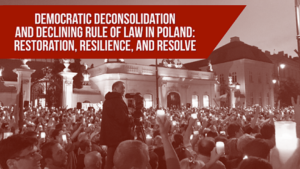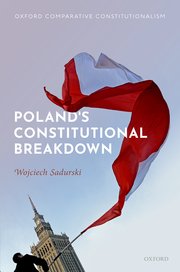
Less than 9% of people in Poland believe that the country’s courts function better now than they did before the current government came to power in 2015, while over half think they have got worse, reports suggest.
It follows a number of other surveys showing dissatisfaction among the public with the government’s radical overhaul of the judiciary, which has brought Poland into conflict with the European Union over the rule of law.
The EU’s unprecedented withholding of Covid relief funds highlights the gravity of Poland’s battle for an independent judiciary, the National Endowment for Democracy (NED) adds:
- These actions follow the court capture of the judiciary by Poland’s ruling Law and Justice party, which has appointed “neo-judges” through unconstitutional means and charged judges who dare to rule against the party’s interests.
- The erosion of the rule of law in Poland represents a sobering example of democratic decline in a country that is a member of the EU and NATO.
- It is crucial to understand how this decline came about, the warning signs to look for in other contexts, and the tools that democracies can use to prevent court capture, including the role of civil society and independent media in drawing public attention to the crisis and then mobilizing people to act.
 In a forthcoming panel discussion, Polish human rights lawyer Michał Wawrykiewicz examine the role of the legal community in civil society, where success has been found in fighting back against the decline of the rule of law, and what the future holds for Poland’s judicial branch. Włodzimierz Wróbel, Supreme Court Justice of the Republic of Poland, and Fernanda Nicola, Professor of Law at American University, will offer comments. NED Senior Program Officer Agnieszka Gmys-Wiktor will moderate.
In a forthcoming panel discussion, Polish human rights lawyer Michał Wawrykiewicz examine the role of the legal community in civil society, where success has been found in fighting back against the decline of the rule of law, and what the future holds for Poland’s judicial branch. Włodzimierz Wróbel, Supreme Court Justice of the Republic of Poland, and Fernanda Nicola, Professor of Law at American University, will offer comments. NED Senior Program Officer Agnieszka Gmys-Wiktor will moderate.
The National Endowment for Democracy (NED) invites you to a conversation with
- Michał Wawrykiewicz, Reagan-Fascell Democracy Fellow; Co-Founder, Free Courts Initiative
- Włodzimierz Wróbel, Supreme Court Justice of the Republic of Poland
- Fernanda Nicola, Professor of Law, American University, Washington College of Law
moderated by
Agnieszka Gmys-Wiktor, Senior Program Officer for Central and Eastern Europe, National Endowment for Democracy.
Tuesday, January 31, 2023. 11:00 a.m.–12:30 p.m. ET
1201 Pennsylvania Ave. NW, Suite 1100, Washington, D.C. 20004
Light refreshments will be served. RSVP
Just published: Aleksandra Gliszczyńska-Grabias and @WojSadurski analyze the decision of the Polish Constitutional Tribunal in case K3/21: ‘Is It Polexit Yet? Comment on Case K 3/21 of 7 October 2021 by the Constitutional Tribunal of Poland’.
Read here: https://t.co/kmhb3G4oxL— European Constitutional Law Review (@Eu_Const) January 20, 2023







